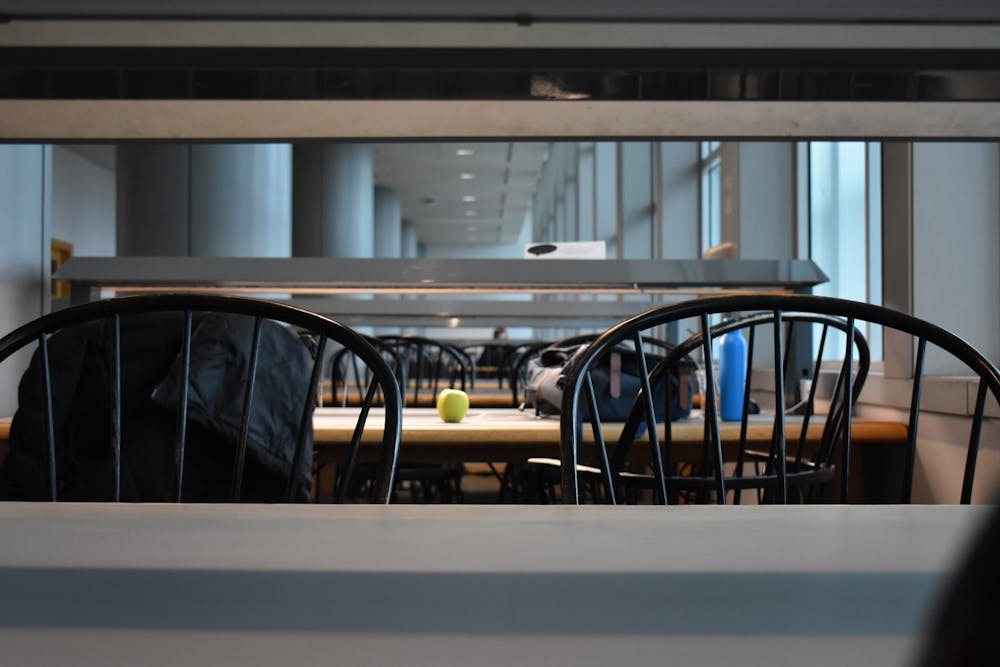The following is a guest contribution and reflects the author’s views alone. For information on how to submit an article to the Opinion Section, click here.
As a Peer Academic Advisor (PAA), I’ve noticed that dealing with Princeton’s workload is one of the hardest adjustments first-year students have to make after arriving on campus. The work, my students would tell me, was not necessarily exceedingly hard — there was just too much of it. In one meeting, a student and I tried to create a schedule in which they would finish all their assignments. Even with minimal sleep and very few breaks, we calculated a week's worth of assignments would take a week and a half to complete. Even if we fit everything in, there would be absolutely no room for free time — time for the student to recharge and pursue their own projects. As a PAA, how could I advise them to manage their time if there simply wasn’t enough of it?
You may know the feeling.
Time is one of the scarcest resources on campus. The fact that Princeton students are excessively busy has been documented for years, and it’s no secret to the University administration. Administrators, faculty, and our own peers offer workshops on tackling procrastination, urge us to dedicate time to our mental health, and encourage us to take walks. College deans repeatedly discourage us from pulling all-nighters or skipping meals when the semester is at its peak. But if the time required to complete assignments exceeds the time frame allotted to them, it can’t be solved by savvy time management strategies. It is a result of a systemic devaluation of students' free time. It doesn’t have to be this way. And it shouldn’t.
There are obvious downsides to such an environment. First, a perpetual time crunch is not conducive to the kind of deep, meaningful learning that is purported to be the hallmark of the University’s education. Time scarcity has been shown to decrease a person’s attention span and ability to focus. A constant time crunch produces a cognitive burden, just like other types of scarcity. Instead of making the most of the fantastic classes Princeton has to offer, students may choose to skim instead of read and skip lectures rather than savor them. The University has the infrastructure to provide us with food and shelter so that we can focus on our studies; providing some free time is equally important.
Time scarcity — the feeling of being hounded by unfinished tasks and "not having enough time" — has been shown to have adverse effects on overall well-being, creativity, performance, and relationships. On the other hand, ample research has documented the positive effects of free, discretionary time on mental and physical wellbeing.
That’s not even to mention the fact that many of us will graduate only to move onto a highly taxing work environment, with 60-hour weeks and endemic burnout. It’s not unreasonable to ask that the University budget some free time for us while we can experience it.
Yes, time management is a critical skill and a valuable lesson to take from college. But it should not be learned through emotional distress or lack of sleep. To be able to manage our time, we first have to have enough of it. This is not a request for leniency; it is a request for the University to allow us to flourish.

Think of all we could be doing if we had one extra hour a week or just the headspace to be at ease. Princeton is home to incredible talent and energy. The initiatives to launch, projects to pursue, and connections to make are endless — but only if people here have the time to engage with their genuine interests and rest. Even if people didn’t choose to spend their free time “productively,” the University would still benefit from having more focused, more engaged students.
Making this a reality is not an overly ambitious goal. Small, relatively cost-free changes to course requirements could make a big difference. It could be required that each class drop one or two assignments from their syllabi, or at least make some assignments optional — not as a way to account for students’ extenuating circumstances, as many classes do now, but as part of a policy that recognizes the importance of students’ discretionary time to their learning. The cumulative effect would be meaningful. A more systemic approach to endorsing free time may include requiring professors to designate a week or two of the semester as a low-workload week.
The University could pursue this goal in a variety of ways. But they have to make students' free time a priority.
Johnatan Reiss is a junior concentrating in politics from Israel. He can be reached at johnatan@princeton.edu.









